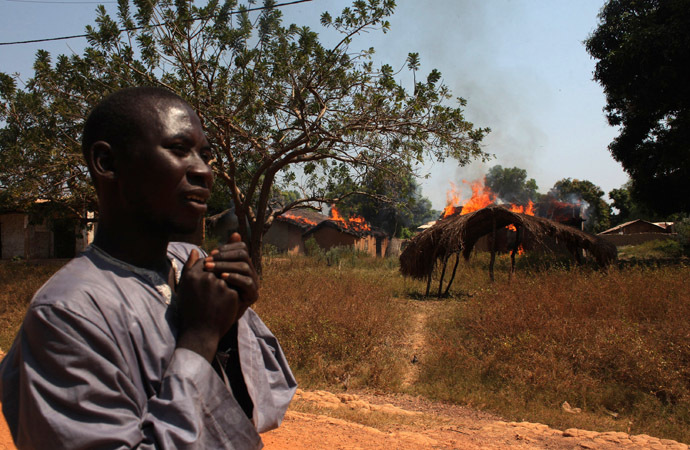Targeted attacks against children, looting and burning of houses have been reported in the ongoing sectarian violence in Central African Republic by the UN’s refugee agency UNHCR. Hundreds of thousands have fled to refugee camps or hidden in the bush.
Violence between mostly Muslim ex-rebel Seleka members, whose leader seized power last March, and Christian vigilante groups “has pushed the number of internally displaced people (IDP) past 935,000 and is hampering humanitarian aid efforts” in Central African Republic (CAR), UNHCR reported on Friday.
The international agency is struggling to gain access to some 45,000 of the displaced in the capital Bangui alone. According to UNHCR, a total of 510,000 people – more half of the city’s population – are sheltering in 67 sites in Bangui, or have moved to live with host families.
“Targeted attacks against civilians, looting and the presence of armed elements at some displacement sites have severely limited humanitarian agencies’ access to those in need of urgent assistance,” a UNHCR spokesman said.
Some 60 per cent of those displaced are children, the refugee agency has estimated.
The international agency is struggling to gain access to some 45,000 of the displaced in the capital Bangui alone. According to UNHCR, a total of 510,000 people – more half of the city’s population – are sheltering in 67 sites in Bangui, or have moved to live with host families.
“Targeted attacks against civilians, looting and the presence of armed elements at some displacement sites have severely limited humanitarian agencies’ access to those in need of urgent assistance,” a UNHCR spokesman said.
Some 60 per cent of those displaced are children, the refugee agency has estimated.
According to UNHCR, since the latest spate of violence in CAR broke out in December, many of the people have gone into “hiding in the bush, fearing fresh attacks.” Others have left for neighboring African countries, with the estimated global number of refugees from CAR reaching 240,000 by end of December.
The UN agency has been scaling up its presence in the country and has requested $152.2 million for a 100-day humanitarian plan.
Earlier, the international children rights group UNICEF said in a statement on its website that there have been “unprecedented levels of violence against children” in CAR, with at least two children reportedly beheaded at the end of the year.
“More and more children are being recruited into armed groups, and they are also being directly targeted in atrocious revenge attacks,” UNICEF Representative in CAR, Souleymane Diabate, said.
The UN agency has been scaling up its presence in the country and has requested $152.2 million for a 100-day humanitarian plan.
Earlier, the international children rights group UNICEF said in a statement on its website that there have been “unprecedented levels of violence against children” in CAR, with at least two children reportedly beheaded at the end of the year.
“More and more children are being recruited into armed groups, and they are also being directly targeted in atrocious revenge attacks,” UNICEF Representative in CAR, Souleymane Diabate, said.
UNICEF has confirmed the killings of at least 16 children by December 30, saying that 60 more had been injured and demanding that the attacks immediately stop.
Doctors Without Borders recently reported another fatal incident involving a minor, with doctor Gaetan Adouaka saying that a 12-year-old died from a gash on his skull. The group’s mission has faced uncertainty since attackers have also started targeting hospitals and refugee camps, according to Karline Kleijer, the emergency manager of Doctors Without Borders.
“The hospitals… are invaded by armed man, we have people with grenades in the hospital, who came there to attack patients inside the hospital,” Kleijer told RT, adding that many people hiding in the bush are also “too scared” to seek medical or humanitarian aid.
“The hospitals… are invaded by armed man, we have people with grenades in the hospital, who came there to attack patients inside the hospital,” Kleijer told RT, adding that many people hiding in the bush are also “too scared” to seek medical or humanitarian aid.
Read more from the source:


No comments:
Post a Comment